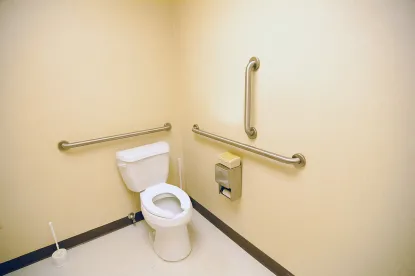Overview
The California State Legislature gave employers many new bills to address on Jan. 1, 2023 (see GT Alert), but not all appear in the Labor Code. One bill that “flies under the radar” is AB 1632 – a restroom-access bill that impacts California employers with employee restrooms.
AB 1632, which is codified at Cal. Health & Saf. Code §§ 118700-118703 and effective Jan. 1, 2023, generally requires certain businesses to allow members of the public with an eligible medical condition to use employee restrooms during normal business hours, even if the employee restroom is not normally available to the public.
AB 1632 applies to any business that is open to the general public for the sale of goods and has an employee restroom. This definition may be interpreted to include retail stores of all sizes, restaurants (including take-out-only restaurants), thrift stores and consignment shops, and virtually every neighborhood strip mall shop that has an employee restroom.
Although many businesses fit this description, a relatively small group of individuals may demand access to employee restrooms. Only individuals lawfully on the premises – a group that is likely broader than mere customers but that does not include trespassers – may request use of the employee restroom. In addition, all of the following conditions must be met:
-
The individual has an “eligible medical condition” or uses an ostomy device;
-
Three or more employees of the place of business are currently working onsite at the time the individual requests use of the employee restroom;
-
The employee restroom is not located in an employee changing area or an area where providing the individual access would create an obvious health or safety risk to the requesting individual, or pose an obvious security risk to the business;
-
Use of the employee restroom would not create an obvious health or safety risk to the requesting individual; and
-
A public restroom is not immediately accessible to the requesting individual.
The statute defines an “eligible medical condition” to mean Crohn’s disease, ulcerative colitis, other inflammatory bowel disease, or another medical condition that requires immediate access to a toilet facility.
A business is not required to make any physical changes to an employee restroom when providing a requesting individual access, but employers should keep in mind that access to and use of the restroom must not pose health or safety risks to the individual; otherwise, a business is not required to grant access in the first instance.
Businesses may require the requesting individual to present reasonable evidence of their eligible medical condition or use of an ostomy device to gain access to the employee restroom. The requesting individual may satisfy this requirement by presenting a signed statement from a licensed physician, nurse practitioner, or physician assistant on a form developed by the State Department of Public Health that attests to the individual’s eligible medical condition requiring immediate access to a restroom.
While there is no private right of action, businesses that deny a requesting individual use of an employee restroom (when all listed conditions are met) are subject a civil penalty of $100 for each violation when the violation is willful or grossly negligent. However, an employee of a business who denies a requesting individual access to the employee restroom is not civilly liable for the violation. Further, the employer may not terminate or discipline the employee for the violation that subjects the business to the $100 penalty, unless the employer has an express policy in place relating to the proper procedure for allowing requesting individuals access to the employee restroom.
Implications
Covered California employers need to be aware of this requirement and consider adopting a written policy for their employees to ensure rightful restroom access is given to a requesting individual. Specifically, the policy should outline the various requirements for properly granting access to a requesting individual with an eligible medical condition, which in turn should reduce the risk of incurring civil penalties for non-compliance.




 />i
/>i


